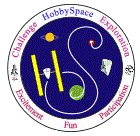Astronomy is obviously the oldest and
most popular of space hobbies. Even the occasional
backyard skywatching by unaided eye or a small telescope
can be a marvelous experience.
There are innumerable web sites already devoted
to general
astronomy and so we start below with
just a guide
to some introductory sites and a few of the major
astronomy link lists.
We will focus here more on sites related to astronomy
projects where amateurs can make significant
contributions.
One of the most wonderful aspects of astronomy
is that amateurs still make significant contributions.
Comets,
for example, are often discovered by non-professional
astronomers.
We put many topics involving near-earth and solar
system based phenomena, e.g. meteor show observation,
aurora investigation, etc., into the Space
Science section. (This is an arbitrary
division but is consistent with the HobbySpace
emphasis on our solar system.)
Note that the Satellite
Watching section also includes astronomy
related information and links such as tracking
programs, utilities
and references. In addition, the offline
and online
software sections include some star chart program
links.
See also the section on SETI,
which discusses projects for both optical and radio amateur
astronomers.
|
|
Astronomy related sections at HobbySpace
|
|
ASTRONET
Carl Koppeschaar's ASTRONET provides links to astronomy
and space sites. Also, daily news
reports available. Sections include
|
|
Astronomy
Cafe
Sten Odenwald's cafe offers you some exploration with
your coffee:
"Have you ever wondered what it might be like
to be an astronomer? Do you have any questions that
you would like an astronomer to answer? Would you
like to hear the latest about hyperspace, black holes,
time travel and quantum cosmology? Well, at the Astronomy
Cafe you've come to the right place! Sit down, grab
a cup of coffee, and have a far-out adventure at the
outer frontier of space and time." - web site.
|
Astronomical
League
Very active organization whose site offers lots
of info and tips for beginners to advanced amateur astronomers.
|
|
Astronomical
Society of the Pacific
A very large and active organization
with members worldwide. Their Mercury
Magazine is a bi-monthly with articles accessible
by a wide audience. A selection of the articles are
online. There is also an online
shop for posters, software, globes, etc.
|
|
Cloudy
Nights Telescope Reviews
Great site with lots of resources such as:
|
|
An astronomy addition to Google
Earth.
|
|
Griffith
Observatory
This observatory & planetarium is dedicated to public
education in astronomy and space exploration. Sky
Information
|
|
Guide
to the Universe
Annemie Maertens takes you on trips through our galaxy
and on out into the universe. Beautiful images and descriptions
of the sights along the way. (In both Dutch and English)
|
|
Inconstant
Moon
Beautifully designed site that offers multimedia tours
of the lunar surface. Includes "maps, photos, explanations,
animations, selected links and even music".
|
|
Que tal in the
Current Skies
An entertaining and readable monthly newsletter for
the casual backyard astronomer. Gives the highlights
of night skys for the coming month.
|
|
Rose Center
for Earth & Space
New York's famous Hayden Planetarium at the American
Museum of Natural History has been replaced with the
$210 million Rose Center. The center includes a new
Planetarium and much more. The web site describes the
new facility and also offers many online activities
and resources.
|
|
SEDS
Galaxy
The website for the Students
for Exploration and Development of Space (SEDS)
provides a broad array of astronomical related links.
Also, see the astronomy images in their archive.
|
|
Stig's
Sky Calendar
Stig Ottosen's site is dedicated to his Java astronomy
and space events calendar program that provides info
on happenings both celestial and on the ground (e.g.
upcoming conferences.)
"Use the Sky Calendar to keep yourself up to
date on local and global sky events. It will display
sunrise/sunset, twilight and lunar phase and visibility
at a glance, and also includes a Planisphere, Planet
Finder and Planet Round-up display. You can even customize
your sky calendar setup with My Sky Calendar."
There is both an online and offline version.
|
|
SkyLights
Professor Jim Kaler provides this site for amateur astronomers.
Includes weekly updates and astronomy news.
|
|
StarDate
The University of Texas McDonald
Observatory presents the popular StarDate
radio show about skywatching. This web site provides
lots of astronomy links and useful tips, especially
for the backyard astronomer.
|
|
The
Starpages
An enormous searchable database for space and astronomy
web resources. Called the "astronomy yellow pages".
Sections nclude:
- StarWorlds
- "astronomy-related organizations, institutions,
associations, companies, and so on: about 6,500 entries
from more than 100 countries with all practical details
available and more than 6,500 hot links"
- StarHeads
- "personal WWW pages of professional astronomers
and related scientists: about 6,000 entries."
- StarBits
- "abbreviations, acronyms, contractions, symbols,
and so on: about 200,000 entries."
|
|
The Telson
Spur -- The Snark Hunter's Page
Link list site with an enormous number of astronomy
and space &
astronautics links, arranged in an innovative classification
scheme. See, for example, sections on Amateur
Astronomy, Sky&Weather.
|
|
John Walker's
Fourmilab Programs
John Walker offers several online and offline (freeware)
astronomy programs, as well as interesting information.
See, for example,
|
|
Microsoft will release this tool in the spring of 2008.
It sounds like it will be a powerful competitor to Google
Sky
|
| Introductions to Astronomy
|
Telescope
Basics
- Telescope Companies
and Stores:
- Binoculars for astronomy:
- Introductory info
|
| Astronomy
for young people
|
|
Astronomy Magazines
The websites for astronomy magazines typically provide
lots of information and resources for astronomers ranging
from the beginner to the pro.
|
|
Astronomy Day (April 16th)
+ Globe at Night
April 16th each year is the time to celebrate our
cosmos and the hobby of astronomy and to participate
in astronomical observations.
|
This world wide program involved lots of educational and
outreach Projects
involved the public in astronomy. It was
a global effort initiated by the International
Astronomical Union and UNESCO to help the citizens of
the world rediscover their place in the Universe through
the day- and night-time sky, and thereby engage a personal
sense of wonder and discovery.
They developed a very elaborate website with many resources
that are still available.
|
A program in which young people are encouraged
to go outside, look skywards after dark, count the
stars they see in certain constellations, and report
what they see online. This Windows to the Universe
Citizen Science Event is designed to encourage learning
in astronomy!
It is part of the Citizen
Science program at Windows
to the Universe.
|
|
Dark Sky Preservation
Light pollution has caused most of the cosmos to
fade from view for people who live in urban/suburban
areas. Extraneous night time illumination, e.g. streetlights
that send wasted light upward rather than reflecting
it downward, reduces the sensitivity of not only scientific
telescopes but of our own eyes to see the dimmer stars
and Milky Way from your back yard.
Here are resources that discuss the problem and efforts
to combat it.
|
|
Organizations for amateurs and students
|
|
Astronomy Tourism - Eclipses,
Northern Lights, Meteor Showers, etc.
It is becoming more and more popular to travel to some
exotic location to observe an astronomy related event.
The most common such trips are to areas where eclipses
will be visible, but now these also include expeditions
to view aurora and meteor showers.
|
|
Orrery
(Solar System Simulator) An Orrery
shows the planets and their orbit around the sun. Mechanical
Orreries have been around for centuries, typically as
beautiful, clockwork-like devices in brass and wood.
Here's a big orrey project meant to run for a long,
long time: Long
Now > Projects > Clock > Orrery
Now one can find them simulated in software but there
are still mechanical versions around. The software versions
offer a lot more options but a mechanical Orrery offer
a more tangible, intuitive and esthetic experience.
|
Amateur
Telescope Making & Other Advanced Topics
- Amateur Telescope
Making Journal
- Ash
Observatory - building a home observatory
- ATM - Amateur
Telescope Maker - A great resource for those who
want to build their own telescope. Includes advanced
techiniques.
- Computer
Operated Telescopes by Mel Bartels
- Telescopes
- including experiences in building Dobsonians
- Telescopes
and Eyepieces - John Savard
- NJ
Night Sky
- Folded
Newtonian Design - by Michael Fallwell
- How
to Build a Telescope by G. Carboni, March 1996 at
Fun Science Gallery
- How
Build Your Own Telescope: Complete Plans for Five
High-quality Telescopes That Anyone Can Build - by
Richard Berry, 2001 - book description
- Astronomy
Boy: Homemade Eyepieces
- Dobson Telescopes
- Simple scopes for educational demonstrations
- $15
Galileoscope - To boost participation in the International
Year of Astronomy 2009, a collaboration
of astronomy organizations has developed a very low
cost, high-quality telescope kit: The
Amazing $15 Telescope - Sky & Telescope - Mar.25.09.
With the Galileoscope,
No matter where you live, with this easy-to-assemble,
50-mm (2-inch) diameter, 25- to 50-power achromatic
refractor, you can see the celestial wonders that
Galileo Galilei first glimpsed 400 years ago and
that still delight stargazers today. These include
lunar craters and mountains, four moons circling
Jupiter, the phases of Venus, Saturn's rings, and
countless stars invisible to the unaided eye.
You can order
the Galileoscope on their website as well as give
a contribution that goes towards donating
scopes to "children, parents, and teachers who
can't afford to buy them, especially in less developed
parts of the world".
|
|
Miscellaneous lunar info and resources:
|
|
Science Topics
Here are some miscellaneous astronomy related science
topics of interest
|
| More
Astronomy sites & Resources
|


